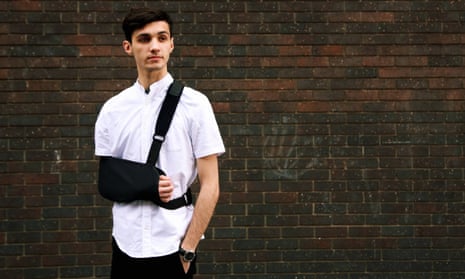A vulnerable young man who was reunited with his family in Cardiff after being separated from them shortly after they had fled Aleppo has been told by the Home Office he has to leave them behind and apply for asylum in Bulgaria instead.
Mohammed Mirzo, 20, told the Guardian he suffered abuse and racism in the southern European country and feared for his safety if he was forced to return only a few months after making it to in the UK.
Mirzo, who was just 16 when the family was torn apart, told the Guardian: “I’m frightened of what will happen if I’m sent back to Bulgaria. I was treated like an animal there. I felt people hated me and hated all refugees.”
He said he was beaten by a police officer in Bulgaria and cheated by traffickers, who on one occasion abandoned him deep in a forest without food and water. “I thought I was going to die,” he said.
Almost 10,000 people have signed a petition calling for Mirzo to be allowed to stay and Cardiff MPs have called on the home secretary, Amber Rudd, to intervene. Mirzo said that after he managed to slip across the border into Germany, he was attacked by neo-Nazis, and he still wears a sling for an injured shoulder. He lived with a pair of drug dealers in Germany before reaching the UK in the back of a lorry carrying coffee after paying a smuggler €2,500.
The first Mirzo’s family knew of their son’s journey to Britain was when they got a call from the police in Cardiff Bay, where he had handed himself in. “I had tried many times to get here and didn’t want to disappoint them if I failed again. So I just came without telling them.” For the first time, Mirzo met his baby brother Evan. “That was the most beautiful moment of my life,” he said.
“I know it’s not a good thing to cross a border as I did but I felt I had no choice. I’m not asking for anything. I just want to be with my family. I’m not complaining about the Home Office – the law’s the law. I have nothing left. Everywhere I get kicked. I just want to start my life. I want to go to university. My dream is to be a footballer but I just want to contribute in some way.”
After the family fled Aleppo, where Mirzo’s father was a teacher, they were scattered across Europe. At one point, Mirzo was in Bulgaria, his brother in Germany and his mother and two sisters in Turkey. His father made it to Cardiff, where he was granted refugee status in 2016, and began to bring his family to Wales.
The rest of the family is doing well. His father, Ali Mirzo, set up the Royal Coast cafe and volunteers as an interpreter for child refugees. His teenage sisters are thriving at school, while his older brother is in work. They all received refugee status and the family expected Mohammed Mirzo’s application to go through smoothly. While he waited on a decision on his situation, Mirzo worked on improving his English and received mental health support.
But when reporting routinely to the Home Office he was detained and held in Parc prison in south Wales for two days before being moved to Campsfield House immigration removal centre in Oxfordshire. He was told he could be sent back to Bulgaria next month.
He was released on Tuesday evening after his case was raised with Rudd at the home affairs committee but no decision has been made on what happens next, leaving him limbo.
His father said the family was deeply concerned. “His life was turned upside-down when he became a refugee at the age of 16 and he lived through suffering in Bulgaria and Germany that no child should experience.”
Mirzo may be removed under the Dublin regulation that says the European Union country that a refugee first arrives in should be responsible for his or her claim.
A Home Office spokesperson said: “The UK has a proud history of providing protection to those who need it, but it is only fair that we do not shoulder the burden of asylum claims that should rightly be considered by other countries.
“Asylum seekers should claim in the first safe country they arrive in. Where there is evidence that an asylum seeker is the responsibility of another European country we will seek to return them there.”
Jonathan Cox, deputy director of Citizens UK, a community charity with which Ali Mirzo volunteers, described the Home Office’s approach as “little short of barbaric”.
He said: “This is happening after Mohammed and his family have finally been reunited and found sanctuary in the UK after four years of separation. The Mirzo family are an asset to our city and to our nation – they belong together in Cardiff. The Home Office must not send Mohammed to Bulgaria.”
